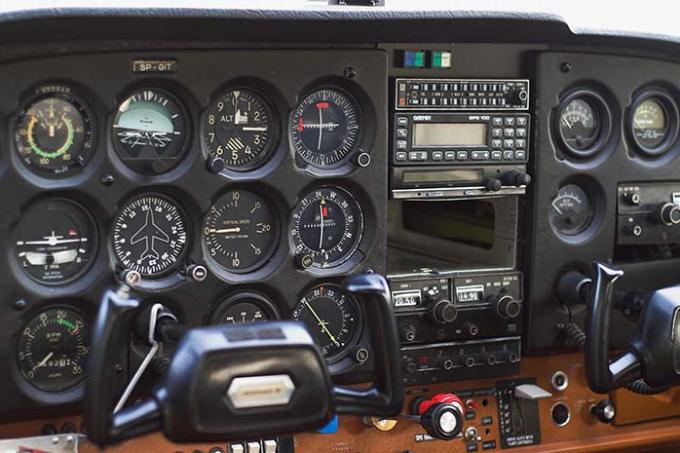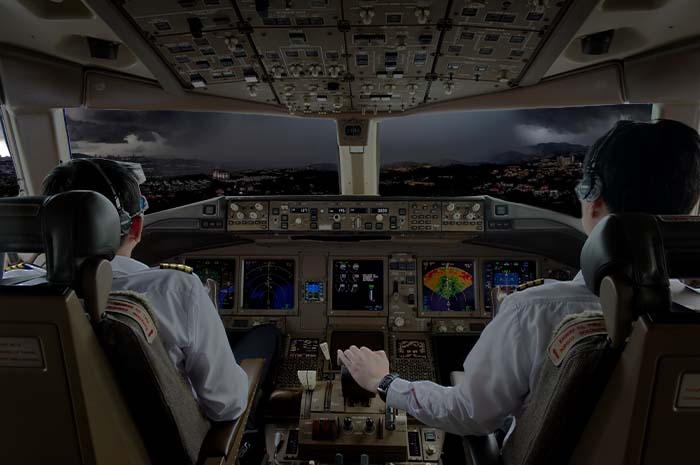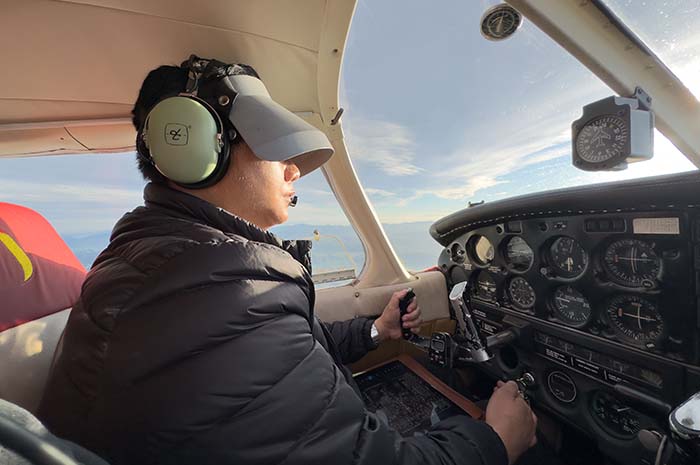
The instrument rating directly impacts a pilot's ability to fly safely, particularly in low-visibility and poor weather. By mastering how to depend on instruments rather than visual perception, pilots reduce the risk of spatial disorientation and inadvertent entry into dangerous weather conditions. This training significantly lowers the risk of accidents by giving pilots the tools to control the aircraft even when external visibility is minimal.
Read More: Private Pilot License vs Instrument Rating
The training of this Instrument Rating will build a good habit of pilots in terms of making critical decisions regarding flight paths, altitude changes, and weather avoidance based on precise instrument readings, ensuring a safer and more confident flying experience. With this level of preparation, pilots are better equipped to handle unexpected weather challenges.

Aircraft Fly to Adverse Weather (Source Picture: Freepik/skawee)
One of the most prominent benefits of an instrument rating is the pilot's ability to navigate through various weather conditions such as clouds, fog, and low visibility. With this rating, pilots are no longer restricted by Visual Flight Rules (VFR), which require good weather for safe operation. Instead, they can rely on the flight instruments for navigating through areas where visual references are compromised. Allowing pilots to have more freedom to fly while still maintaining safety.

Instrument Training with IFR View Limiting Devices (Image Source: Documentation by 14DAYPILOT)
Pilots who undergo instrument training are thoroughly prepared for the challenges of flying in low-visibility environments. Training programs focus on mastering the use of tools such as the VOR (VHF Omnidirectional Range), DME (Distance Measuring Equipment), and GPS (Global Positioning System) to be able to practice ILS (Instrument Landing System), VOR, and RNAV approaches. these are essential for ensuring safe flight and landings when weather conditions obscure external visual cues. These systems guide pilots to land precisely, even in poor visibility.
The training includes simulations of real-life weather scenarios at simulators, or even in real airplane using a view limiting device, allowing pilots to practice flying by solely referencing to aircraft instruments. This preparation ensures that when pilots encounter weather conditions that restrict their visual cue in actual flights, they are confident and capable of handling them.
One of the less obvious but equally critical benefits of obtaining an instrument rating is the improvement in decision making during flight. The rigorous training instills a sense of precision and caution, which are invaluable when flying in difficult weather or low-visibility environments. Pilots learn to follow approach procedures carefully, determine alternate routes in case of unexpected weather conditions, and make quick yet well-informed decisions in complex situations.
This heightened ability to assess risks and plan contingencies not only increases the pilot's safety but also enhances the overall safety of air travel. Instrument-rated pilots are equipped with the knowledge and tools to make better flight decisions, ensuring that they, their passengers, and their aircraft reach their destinations safely.
Read More: The Dramatic Journey of Athira’s Instrument Rating Course
Obtaining an instrument rating is not just a certification, it’s a critical step toward becoming a safer, more skilled pilot, capable of flying in poor weather conditions and low visibility. With this rating, you’ll enhance your decision making, improve safety, and confidently navigate through clouds, fog, and adverse conditions using advanced instrument techniques.
At 14DAYPILOT, we offer an Accelerated Instrument Rating Program designed to get you ready as an Instrument Rated pilot in just 10 days. Whether you're a private or commercial pilot, our program equips you with the skills to fly safely, in various weather conditions.
Take the next step in your pilot journey and work toward earning your Instrument Rating with our 10 Day Accelerated Instrument Rating Program! Enroll now to start building the skills you need to fly confidently in any weather condition.

Instrument Rating is a crucial certification for pilots that enhances their ability to operate in challenging weather conditions. Flying an aircraft requires skill, precision, and the ability to adapt to changing conditions, especially when visibility is compromised. This is where an instrument rating comes into play. An instrument rating allows pilots to operate under Instrument Flight Rules (IFR), meaning they can navigate and land in poor weather conditions, relying solely on the aircraft’s instruments. In this article, we’ll explore why an instrument rating is essential for safer flying, how it improves safety, and the benefits it offers in various flight conditions.
The instrument rating directly impacts a pilot's ability to fly safely, particularly in low-visibility and poor weather. By mastering how to depend on instruments rather than visual perception, pilots reduce the risk of spatial disorientation and inadvertent entry into dangerous weather conditions. This training significantly lowers the risk of accidents by giving pilots the tools to control the aircraft even when external visibility is minimal.
Read More: Private Pilot License vs Instrument Rating
The training of this Instrument Rating will build a good habit of pilots in terms of making critical decisions regarding flight paths, altitude changes, and weather avoidance based on precise instrument readings, ensuring a safer and more confident flying experience. With this level of preparation, pilots are better equipped to handle unexpected weather challenges.

Aircraft Fly to Adverse Weather (Source Picture: Freepik/skawee)
One of the most prominent benefits of an instrument rating is the pilot's ability to navigate through various weather conditions such as clouds, fog, and low visibility. With this rating, pilots are no longer restricted by Visual Flight Rules (VFR), which require good weather for safe operation. Instead, they can rely on the flight instruments for navigating through areas where visual references are compromised. Allowing pilots to have more freedom to fly while still maintaining safety.

Instrument Training with IFR View Limiting Devices (Image Source: Documentation by 14DAYPILOT)
Pilots who undergo instrument training are thoroughly prepared for the challenges of flying in low-visibility environments. Training programs focus on mastering the use of tools such as the VOR (VHF Omnidirectional Range), DME (Distance Measuring Equipment), and GPS (Global Positioning System) to be able to practice ILS (Instrument Landing System), VOR, and RNAV approaches. these are essential for ensuring safe flight and landings when weather conditions obscure external visual cues. These systems guide pilots to land precisely, even in poor visibility.
The training includes simulations of real-life weather scenarios at simulators, or even in real airplane using a view limiting device, allowing pilots to practice flying by solely referencing to aircraft instruments. This preparation ensures that when pilots encounter weather conditions that restrict their visual cue in actual flights, they are confident and capable of handling them.
One of the less obvious but equally critical benefits of obtaining an instrument rating is the improvement in decision making during flight. The rigorous training instills a sense of precision and caution, which are invaluable when flying in difficult weather or low-visibility environments. Pilots learn to follow approach procedures carefully, determine alternate routes in case of unexpected weather conditions, and make quick yet well-informed decisions in complex situations.
This heightened ability to assess risks and plan contingencies not only increases the pilot's safety but also enhances the overall safety of air travel. Instrument-rated pilots are equipped with the knowledge and tools to make better flight decisions, ensuring that they, their passengers, and their aircraft reach their destinations safely.
Read More: The Dramatic Journey of Athira’s Instrument Rating Course
Obtaining an instrument rating is not just a certification, it’s a critical step toward becoming a safer, more skilled pilot, capable of flying in poor weather conditions and low visibility. With this rating, you’ll enhance your decision making, improve safety, and confidently navigate through clouds, fog, and adverse conditions using advanced instrument techniques.
At 14DAYPILOT, we offer an Accelerated Instrument Rating Program designed to get you ready as an Instrument Rated pilot in just 10 days. Whether you're a private or commercial pilot, our program equips you with the skills to fly safely, in various weather conditions.
Take the next step in your pilot journey and work toward earning your Instrument Rating with our 10 Day Accelerated Instrument Rating Program! Enroll now to start building the skills you need to fly confidently in any weather condition.
Ilham Febrian is a dedicated aviation blogger with a strong interest and high expectations for the aviation industry. He holds a DGCA Commercial Pilot license with Airbus A320 type rating. Continuously updated with the latest aviation news, Ilham strives to provide top-quality content on the website, aimed at assisting all pilots. The website focuses on offering flight training guidance, information on flying school materials, and tips on how students can successfully pass their check rides.
Ilham Febrian is a dedicated aviation blogger with a strong interest and high expectations for the aviation industry. He holds a DGCA Commercial Pilot license with Airbus A320 type rating. Continuously updated with the latest aviation news, Ilham strives to provide top-quality content on the website, aimed at assisting all pilots. The website focuses on offering flight training guidance, information on flying school materials, and tips on how students can successfully pass their check rides.